Skype: neodalle-travel
Tel: +86 135 7447 2266
E-mail: sales@visitaroundchina.com
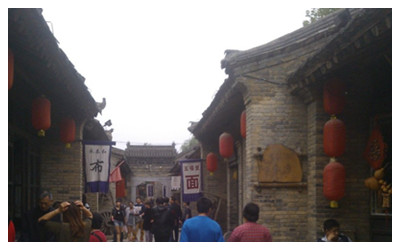 Dayun Village is located in Liquan County, northwest China's Shaanxi Province. Ask locals to name a “honey-pot” under the administration of the Xianyang prefecture and they are far more likely to be acquainted with Yuanjia Village.
Dayun Village is located in Liquan County, northwest China's Shaanxi Province. Ask locals to name a “honey-pot” under the administration of the Xianyang prefecture and they are far more likely to be acquainted with Yuanjia Village.
On the surface, Yuanjia Village looks like another magnificent hangover from the nineteenth century. Less ornate and more workaday than Dangjia Village, the main street sweeps gently down a hill towards many mu of orchards. As visitors pass the terraces housing Qing-style workshops and small restaurant units, they tread along adobe tiles replete with character-ful scuffs and pits. This in itself is a marked change from being in the metropolis where concrete or waxy-textured red and white paving squares form the perpetual terrain.
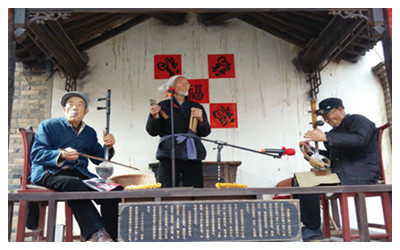 Absent too is any kind of molded plastic, neon or cellophane frippery. Shops advertise their wares and signature dishes through hand-painted flags which flap from the awnings. Buying a simple bowl of noodles is an invitation to watch artistry at work. The dough is mixed, kneaded and pulled manually, and the resultant strands – all of equal length – hung from the rafters of the kitchen.
Absent too is any kind of molded plastic, neon or cellophane frippery. Shops advertise their wares and signature dishes through hand-painted flags which flap from the awnings. Buying a simple bowl of noodles is an invitation to watch artistry at work. The dough is mixed, kneaded and pulled manually, and the resultant strands – all of equal length – hung from the rafters of the kitchen.
The thoroughfare reaches a bottleneck before expanding into a square complete with a public stage. This performs a range of functions, from housing a superannuated band which reels off airs from Shaanxi Opera to serving as the platform for a manic, bald-pated gentleman who chants esoterically and spins bowls as he doles out tea from a dragon-crested copper kettle. Neither of these activities rouses much of a twitter from the press of tourists below. A few of the gamer ones pay for head-massages, with the optional extra of having their ears scraped out with a horn rod. Once inserted, the implement is waggled and twisted to the most irksome of angles.
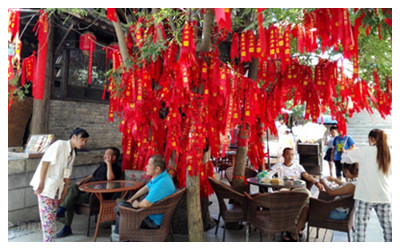 Loca Speacial Products:
Loca Speacial Products:
1. The Rural Tofu
The rural tofu factory is scarcely palatial. Little more than a large kitchen, the constant scurrying of the hands from one work station to another makes it a little difficult to observe each step in linear fashion. Added to that, the wafts of steam mar one’s visibility and leaves photographs haloed in condensation.
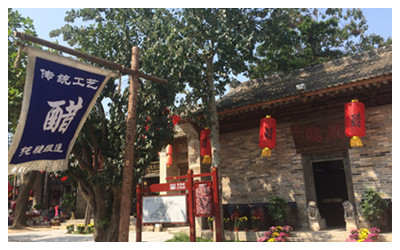 2. Chunliang vinegar
2. Chunliang vinegar
The other “special” products offer greater entertainment value if not necessarily olfactory savour. Chunliang vinegar is distilled from massive earthenware demijohns in a neighbouring unit. The proprietors of the factory have arranged the resultant terracotta jars of condiment with all the care and attention that might be bestowed upon whiskey or vintage claret.
3. Sweetness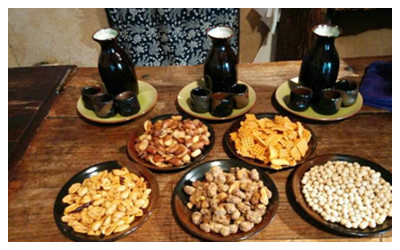
At the other end of the taste spectrum, sweetness is to be found in Yuanjiacun honey, yoghurt, or fruit alcohol (lao zao). The latter has a cavernous bar dedicated to its honour. Curiously and incongruously where one might expect to find replica prints of calligraphy by Yu Youren or Shi Li, the walls are bedecked with memorabilia from the Hong Kong and Taiwan pop industries. I could pick out the late Teresa Teng - said to rule the airwaves by night while Deng Xiaoping ruled the country by day - and Mei Yanfang, the torch-singer and best friend of Leslie Cheung. A few Western artistes (vide a monochrome print of the recently deceased Elizabeth Taylor) were also creeping into the frame.
A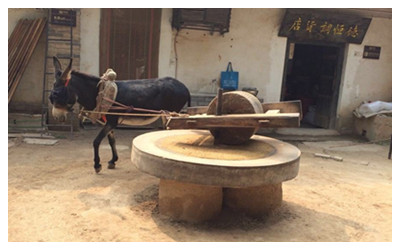 round the corner, a lone donkey operates a grindstone reducing dried chillis into powder. Its eyes are blinkered, so it can have no distraction from its solitary task. The Shaanxi specimen was not so unfortunate, yet its retirement prospects probably leant towards the knacker’s yard rather than the pasture.
round the corner, a lone donkey operates a grindstone reducing dried chillis into powder. Its eyes are blinkered, so it can have no distraction from its solitary task. The Shaanxi specimen was not so unfortunate, yet its retirement prospects probably leant towards the knacker’s yard rather than the pasture.
Scratch away the Qing veneer and this is clearly no Dangjia Village. The present village was designed in the later twentieth-century as the most endearing, not to say bankable, of deceptions. Yuanjiacun bills itself with the slogan “Ecosystem Life Experience”, placing special emphasis upon how all of the products on sale, not least the “Eight Specialities”, are made from ingredients grown within the village boundaries and processed by using traditional methods. British tourists, however, may think of the place as being a “living heritage museum”, something along the lines of York’s Castle Museum or the Beamish Museum in the North East of England.
Tarvel Tips
Add:Liquan County, northwest China's Shaanxi Province.
Entrance Fees: CNY 50
Opening Hours: 08:00-18:00
 Ask Questions ?
Ask Questions ?